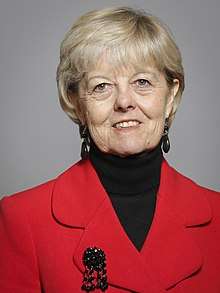Dianne Hayter
Dianne Hayter, Baroness Hayter of Kentish Town (born 7 September 1949) is a British politician and Labour Co-operative member of the House of Lords. She served as a member of the Labour Party National Executive Committee from 1998 to 2010, representing the Socialist Societies. She was Chair of the Labour Party from 2007 to 2008.
The Baroness Hayter of Kentish Town | |
|---|---|
 | |
| Shadow Deputy Leader of the House of Lords | |
| Assumed office 27 June 2017 | |
| Leader | Keir Starmer Jeremy Corbyn |
| Member of the House of Lords Lord Temporal | |
| Assumed office 22 June 2010 Life Peerage | |
| Personal details | |
| Born | 7 September 1949 Hanover, Lower Saxony, Germany |
| Political party | Labour Co-operative |
| Alma mater | Trevelyan College, Durham University of London |
She has also held a number of executive and non-executive roles.
In the Lords, she has served as a Whip and as Shadow spokesperson for several departments.
She is deputy leader of Labour in the Lords.
Early life
She is the daughter of Flt Lt Alec Bristow Hayter (d 1972), and Nancy Evans (d 1959). Educated at Trevelyan College, Durham University, where she studied Social and Public Administration (BA),[1] she gained a doctorate at London University in 2004.
Labour Party
Hayter was the General Secretary of the Fabian Society between 1976 and 1982 and Chief Executive of the European Parliamentary Labour Party during 1990 to 1996.
She sat on Labour's National Executive Committee from 1998 to 2010 and chaired it in 2007–08.
The Labour History Archive and Study Centre at the People's History Museum in Manchester holds the personal papers of Dianne Hayter in their collection, spanning from the late 1970s to 2010.[2]
Other roles
From 1984 to 1990, she was a director of Alcohol Concern.
From 1996 to 1999, she was Director of Corporate Affairs for the Wellcome Trust.
Hayter is a board member of a number of organisations, including the Financial Reporting Council's Board of Actuarial Standards, the Determinations Panel of The Pensions Regulator, the Surveying Ombudsman Service, and the Insolvency Practices Council. She is chair of the Legal Services Consumer Panel and was formerly vice chairman of the Financial Services Authority Consumer Panel and chair of the Consumer Panel of the Bar Standards Board.[3]
She was a JP from 1976 to 1990.
House of Lords
On 22 June 2010, she was created a life peer as Baroness Hayter of Kentish Town, of Kentish Town in the London Borough of Camden, and was introduced in the House of Lords the same day.[4][5]
She was a Whip from October 2011 to September 2015. She has been Shadow Spokesperson for a number of departments.
She was elected Deputy leader of Labour in the Lords in June 2017.
She is a member of Labour Friends of Israel.[6]
In July 2019, she was sacked as Shadow Brexit Minister for making what Labour called "deeply offensive" remarks at a Labour First group meeting, asserting that the party's leadership was not open to external views and comparing them to being "in a bunker" like the "last days of Hitler".[7][8]
Personal life
Dianne Hayter lives in Kentish Town, London with her husband, Professor (Anthony) David Caplin, whom she married in 1994.[9]
Publications
Hayter has written Fabian Tract no. 451—The Labour Party: Crisis and Prospects (September 1977), Fightback—Labour's traditional right in the 1970s and 1980s (2005), and Men Who Made Labour—Celebrating the Centenary of the Parliamentary Labour Party (2006) (with Lord Haworth).
- The Labour Party: crisis and prospects (Fabian Soc.), 1977;
- (contrib.) Labour in the Eighties, 1980;
- (contrib.) Prime Minister Portillo and Other Things that Never Happened, 2003;
- Fightback!: Labour's Traditional Right in the 1970s and 1980s, 2005;
- (ed jtly with Lord Haworth) Men Who Made Labour, 2006;
- (contrib.) From the Workhouse to Welfare, 2009.
References
- Voice for the People, Durham University, retrieved 13 December 2009
- Collection Catalogues and Descriptions, Labour Party Archive and Study Centre, archived from the original on 13 January 2015, retrieved 5 February 2015
- Consumer Panel, Bar Standards Board, archived from the original on 20 August 2008, retrieved 22 June 2008
- Today in the Lords
- "No. 59470". The London Gazette. 25 June 2010. p. 12025.
- "LFI Supporters In Parliament". Labour Friends of Israel. Retrieved 10 May 2019.
- "Labour peer Baroness Hayter sacked for Jeremy Corbyn criticism". BBC News. 18 July 2019. Retrieved 18 July 2019.
- Walawalkar, Aaron (18 July 2019). "Corbyn sacks shadow Brexit minister for 'Hitler in the bunker' comment". The Guardian. Retrieved 18 July 2019.
- Once they were revolutionaries, Camden New Journal, 4 November 2005, retrieved 22 June 2008
External links
- Labour Party profile
- National Consumer Council profile
- Fightback!: Labour's Traditional Right in the 1970s and 1980s, Dianne Hayter, 2005, ISBN 0-7190-7271-9
| Party political offices | ||
|---|---|---|
| Preceded by Thomas Ponsonby |
General Secretary of the Fabian Society 1976–1982 |
Succeeded by Ian Martin |
| Preceded by Oonagh McDonald |
Chair of the Fabian Society 1992–1993 |
Succeeded by Ben Pimlott |
| Preceded by Ian McCartney |
Socialist societies representative on the Labour Party National Executive Committee 1998–2010 |
Succeeded by Keith Vaz and Simon Wright |